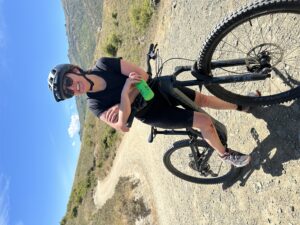Wanaka | Remarkable Physios, The Landing, Unit 15
5 Hawthorne Drive
Frankton, Queenstown
Meet
Sally Monk
Home > Who we are > Sally Monk
About Sally
An outdoor enthusiast and devoted mum of two, Sally Monk has dedicated nearly 20 years to the field of pelvic health, treating everything from pelvic pain and incontinence to prolapse and postpartum recovery. Sally’s passion for Women’s and Men’s pelvic health physiotherapy is deeply rooted in her commitment to understanding the complexities of pelvic health and helping others regain their confidence and well-being. With her warm, approachable nature and exceptional clinical skills, Sally ensures every patient receives personalised, compassionate care. She is committed to breaking down barriers and reducing the stigma surrounding pelvic health, empowering her patients with the knowledge and support they need on their path to recovery.
Sally Monk is passionate about pelvic health and is constantly deepening her knowledge through ongoing education and collaboration. Having worked extensively in Auckland, including clinics focused on pelvic pain, she brings a unique blend of the latest medical research and a compassionate, human-centered approach to her practice. Sally works closely with urologists, gynecologists, and other health professionals to ensure a comprehensive and collaborative care experience for her clients.
Whether supporting men dealing with continence issues, pelvic pain, or rehabilitation after prostate surgery, or helping women navigate complex pelvic health challenges, Sally is committed to uncovering the root causes of symptoms and delivering life-changing results. With strong relationships across the medical community, Sally is dedicated to ensuring no one feels alone in their pelvic health journey, providing expert care with warmth and understanding.
More about Sally
Fun Facts
- Guilty pleasure:
- Fave movie:
- 3 people you would love to have dinner with:
- I love pelvic physiotherapy because:
- Fave book:
- Favourite Place:
- Favourite space in Wanaka:
- Moves:
- Surprised to know:
Conditions Sally treats
Stress, urge or mixed incontinence, dysuria (painful passing of urine), overactive bladder, overflow incontinence. Weak pelvic floor muscles contributing to stress incontinence, urinary urge incontinence and pelvic organ prolapse. Pelvic floor muscles are too tight and have a high tone.
Birth preparation, incontinence, pelvic girdle pain, pregnancy pain, pubic symphysis pain, rib and upper back pain, swollen legs, anorectal pain, posture and back care.
Abdominal and pelvic muscles, scars (c-section, episiotomy, 3rd and 4th-degree perineal tears from instrumental delivery), diastasis recti (abdominal muscle separation), strength endurance and function of the pelvic floor, skeletal alignment, diaphragm and breathing, pelvic organ prolapse, pelvic pain, incontinence (stress and urge), trapped air in the vagina and mastitis.
Faecal (poo) and flatal (wind) incontinence/soiling, difficulty emptying (including obstructive defaecation) and urgency.
Bowel, bladder and uterine.
Hysterectomy and surgery for pelvic organ prolapse.
Persistent pelvic pain conditions, ano-rectal pain, sacral, coccyx thoraco-lumbar, abdominal-pelvic, perineum pains, Pudendal nerve pain, scarring, dyspareunia (difficult or painful sex), vaginismus (involuntary tightening of the muscles around the vagina). For men, pain in the testes, scrotum, and genitals.
Pregnancy, scaring, haemorrhoids, overactive pelvic floor.
Erectile dysfunction, decreased sensation, vaginal dryness, painful sexual intercourse or intimacy.
Urinary incontinence or bowel issues after surgery. Erectile dysfunction.
Day time wetting, constipation, bed wetting, encopresis


